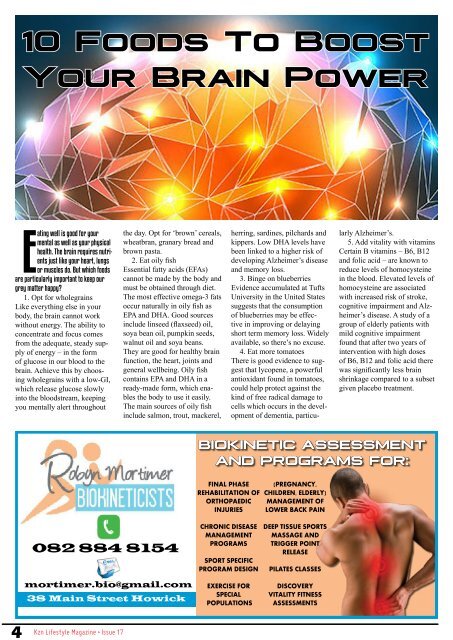Create successful ePaper yourself
Turn your PDF publications into a flip-book with our unique Google optimized e-Paper software.
10 Foods To Boost<br />
Your Brain Power<br />
Eating well is good for your<br />
mental as well as your physical<br />
health. The brain requires nutrients<br />
just like your heart, lungs<br />
or muscles do. But which foods<br />
are particularly important to keep our<br />
grey matter happy?<br />
1. Opt for wholegrains<br />
Like everything else in your<br />
body, the brain cannot work<br />
without energy. The ability to<br />
concentrate and focus comes<br />
from the adequate, steady supply<br />
of energy – in the form<br />
of glucose in our blood to the<br />
brain. Achieve this by choosing<br />
wholegrains with a low-GI,<br />
which release glucose slowly<br />
into the bloodstream, keeping<br />
you mentally alert throughout<br />
the day. Opt for ‘brown’ cereals,<br />
wheatbran, granary bread and<br />
brown pasta.<br />
2. Eat oily fish<br />
Essential fatty acids (EFAs)<br />
cannot be made by the body and<br />
must be obtained through diet.<br />
The most effective omega-3 fats<br />
occur naturally in oily fish as<br />
EPA and DHA. Good sources<br />
include linseed (flaxseed) oil,<br />
soya bean oil, pumpkin seeds,<br />
walnut oil and soya beans.<br />
They are good for healthy brain<br />
function, the heart, joints and<br />
general wellbeing. Oily fish<br />
contains EPA and DHA in a<br />
ready-made form, which enables<br />
the body to use it easily.<br />
The main sources of oily fish<br />
include salmon, trout, mackerel,<br />
herring, sardines, pilchards and<br />
kippers. Low DHA levels have<br />
been linked to a higher risk of<br />
developing Alzheimer’s disease<br />
and memory loss.<br />
3. Binge on blueberries<br />
Evidence accumulated at Tufts<br />
University in the United States<br />
suggests that the consumption<br />
of blueberries may be effective<br />
in improving or delaying<br />
short term memory loss. Widely<br />
available, so there’s no excuse.<br />
4. Eat more tomatoes<br />
There is good evidence to suggest<br />
that lycopene, a powerful<br />
antioxidant found in tomatoes,<br />
could help protect against the<br />
kind of free radical damage to<br />
cells which occurs in the development<br />
of dementia, particularly<br />
Alzheimer’s.<br />
5. Add vitality with vitamins<br />
Certain B vitamins – B6, B12<br />
and folic acid – are known to<br />
reduce levels of homocysteine<br />
in the blood. Elevated levels of<br />
homocysteine are associated<br />
with increased risk of stroke,<br />
cognitive impairment and Alzheimer’s<br />
disease. A study of a<br />
group of elderly patients with<br />
mild cognitive impairment<br />
found that after two years of<br />
intervention with high doses<br />
of B6, B12 and folic acid there<br />
was significantly less brain<br />
shrinkage compared to a subset<br />
given placebo treatment.<br />
4<br />
Kzn Lifestyle Magazine • Issue 17


















